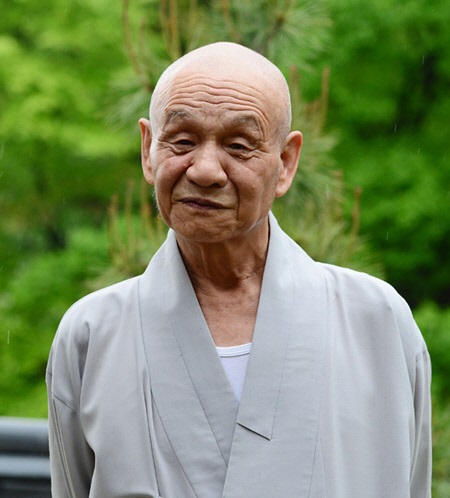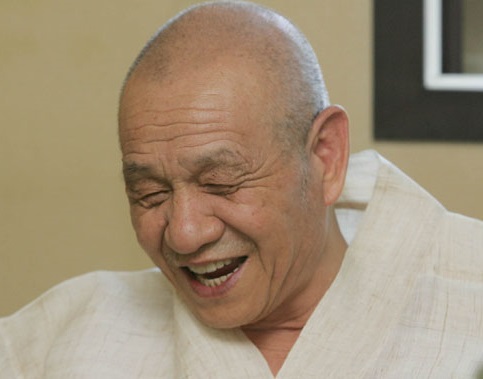ZEN MESTEREK ZEN MASTERS
« Zen főoldal
« vissza a Terebess Online nyitólapjára

조오현 / 曺五鉉 Jo O-hyeon (1932-2018)
[= Cho O-hyŏn, Cho Oh-hyun]
Buddhist name: 설악무산 / 雪嶽霧山 Seorak Musan
Dharma name: 만악 / 萬嶽 Manak
(Magyar átírás:) Cso O-hjon; Szorak Muszan; Manak
http://en.wikipedia.org/wiki/Cho_Oh-hyun
https://web.archive.org/web/20140620142735/http://manak.org.in/?page_id=7
Master Cho Oh-hyun, who writes under the pen names “Musan” and “Manak,” was born in 1932 in Miryang in South Gyeongsang Province of Korea. He has lived in the mountains since he became a novice monk at the age of seven. Over the years he has written over a hundred poems, including many in sijo form. In 2007 he received the Cheong Chi-yong Literary Award for his book Distant Holy Man. The lineage holder of the Mt. Gaji school of Korean Nine Mountains Zen, he is currently in retreat at Baekdamsa Temple at Mt. Seoraksan. Translations of his poetry have appeared in Asymptote, the Buddhist Poetry Review, Asia Literary Review, The Adirondack Review, and World Literature Today.
GATHA OF ENLIGHTENMENT
A Remote Holy Man
Cho Oh-HyunToday, as a single day
A single day, this todayHave seen the Sun rising
Had seen the Sun setNothing to see any more
Dayflies swan dead after hatchThe time passed already for past away
However I am still alive
One day of some days, even not seems to be livedEven though being lived for a millennium
A holy man
Remote dayflies swam
Most Ven. Cho Oh-Hyun is Spiritual master of the Manhae Foundation of Baekdamsa monastery village where is located at the Mt Inner Seorak valley. The above poem, ‘ A Remote Holy Man’ is recognized as a song of his enlightenment

Musan's Ten Bulls (심우도)
PDF: For Nirvana: 108 Zen Sijo Poems
by Cho Oh-Hyun
Translated by Heinz Insu Fenkl. Introduction by Kwon Youngmin
Columbia University Press, 2016
For Nirvana features exceptional examples of the poet Cho Oh-Hyuns award-winning work. Cho Oh-Hyun was born in Miryang, South Gyeongsang Province, Korea, and has lived in retreat in the mountains since becoming a novice monk at the age of seven. Writing under the Buddhist name Musan, he has composed hundreds of poems in seclusion, many in the sijo style, a relatively fixed syllabic poetic form similar to Japanese haiku and tanka. For Nirvana contains 108 Zen sijo poems (108 representing the number of klesas, or defilements, that one must overcome to attain enlightenment). These transfixing works play with traditional religious and metaphysical themes and include a number of story sijo, a longer, more personal style that is one of Cho Oh-Hyuns major innovations. Kwon Youngmin, a leading scholar of sijo, provides a contextualizing introduction, and in his afterword, Heinz Insu Fenkl reflects on the unique challenges of translating the collection.
![]()
PDF: Manak Gathas 《 만악가타집 》
Zen-Gedichte aus Korea
Die Essenz der Koan-Schulung des ehrwürdigen Meisters
Musan Cho Oh-Hyun
https://web.archive.org/web/20120417015727/http://manak.org.in:80/wp-content/uploads/pdf-manak/books/Manak%20Gathas%20in%20German.pdf